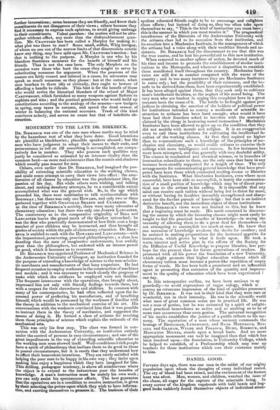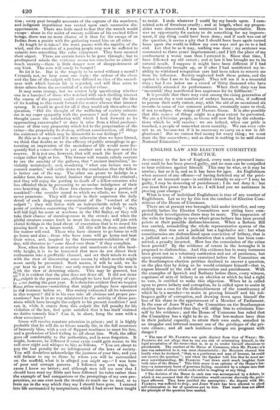DANIEL GOOD.
FIFTEEN days ago, there was one man in the midst of our mighty population upon whom the thoughts of every individual rested. The cry of blood had been raised, and the excitement of the human hunt was afoot. Men; women, and children, watched the issue of the chase, all eager for the capture of the miserable being. In every corner of the kingdom vagabonds with bald heads and hag- gard looks suddenly found themselves objects of individual attea-
tion ; every post brought accounts of the capture cf the murderer, and indignant impatience was vented upon each successive dis-
appointment. There was little need to fear that the wretch would escape: alone in the midst of twenty millions of his excited fellow beings, there was no more chance of it than for the escape of an Indian from a prairie with fire gathering round him on all sides. At length he is taken ! the word passes with the rapidity of the -wind, and the emotion of a panting people may now be suffered to
subside into something like calm enjoyment. They have secured their object. There are certain forms to be gone through ; but to predisposed minds the evidence seems too conclusive to admit of much anxiety—there is little danger now of disappointment of any kind. The man will surely be hanged ! So let it be. But is the tragedy to be acted without a moral ? Certainly not, we hear some one reply : the ardour of the chase and the fate of the culprit will have diffused an idea of the sacred- ness with which human life is regarded, and will thus serve to deter others from the committal of a similar crime.
It may seem strange, but we cannot help questioning whether one in a hundred of those who watched with such thrilling interest the course of the pursuit could conscientiously say that the idea of its leading to this result formed the source whence that interest sprung. It would be good for all if they would ask themselves the question, "Did the thought of the wellbeing of society animate me in my eager sympathy with the pursuers ? and does the same thought cause the satisfaction with which I look forward to its approaching catastrophe ? or does it arise front a blind predomi- nance of that very propensity which led to the perpetration of the crime—the propensity to destroy, without consideration, all things the existence of which may be distasteful to our feelings ?"
Be this is it may—and if it were otherwise than we have hinted, we think that doubts as to the efficacy of public stranglings in ge- nerating an impression of the sacredness of life would more fre- quently find a voice—there is yet another and a deeper moral in reserve. It is not one, however, that will reach the heart of the vulgar either high or low. The former will remain calmly content to see the sanctity of the gallows, that " ancient institution," in- violably maintained; and, wondering " what can induce men to commit murder," will settle down to the conclusion that the fellow is better out of the way. The other are prone to indulge in a milder form the same brutal instinct that prompted this criminal; and they will enjoy the putting to death of a fellow-creature who has offended them by presuming to an undue indulgence of their own besetting sin. To these two classes—how large a portion of mankind !—the sounder moral to which we allude, we know, will never penetrate. They will devour in their eagerness the daily detail of each disgusting concomitant of the "conduct of the culprit "; they will listen with an indescribable relish to each point of evidence concerning the "mutilation of the body "; they will bid high for seats at windows in the Old Bailey, or they will take their chance of standing-room in the crowd; and when the pitiful creature comes forth to meet his doom, they will join with elated feelings in the loud shout of execration that is to sound his passing knell to a future world. All this will be done, and there the matter will end. Those who have dinners to go home to will go home and dine ; those who have none will go home and beat their wives, and, inspired by the Government-exhibition of the day, will threaten to "come Good over them" if they complain. Now, when the horror at murder and murderers is at this laud- 'able height, it is to be lamented that men do not direct their enthusiasm into a profitable channel, and set their minds to work with the view of discovering sonic means by which murder might more surely be prevented. Such means, it will be said, we do our best to put in force: our only reason for hanging the man is tith t the view of deterring others. This may be granted, but all Il it s evident that the plan does not deter all. It did not deter pmculprit in the present case, although we have had plenty of exe- in olms during the past year. It is therefore evident that we require meiother means—something that might perhaps have operated in th instance before us. Has society exhausted all its resources in this respect ? did it in his case take all obvious and proper pre- cautions ? has it in no way ministered to the activity of those pas- sions which have brought the culprit to his present condition ? and can it, while it exacts from this culprit the full penalty for his violation of the law, feel quite satisfied that it has itself violated no duties towards him ? Can it, in short, hang the man with a clear conscience ?
Goon will receive constant attention in prison ; and it is highly probable that he will die as felons usually die, in the full assurance of heavenly bliss, with a sort of flippant readiness to meet his fate, and a profession of kind feeling to all about him. Well, the affair goes off comfortably to the authorities, and is soon forgotten. It might, however, be different if some cynic could gain access to his cell over night and whisper to hint as follows. " You are about to pay the last penalty for ant infringement of the laws of society. You will doubtless acknowledge the justness of your fate, and you will forbear to say to those by whom you will be surrounded on the scaffold, what it is alleged you mi,vht say—' I was born of poor and corrupt parents. I followed my own ways, be- cause I knew no better; and although men tell me now that I should have read my Bible and have followed its rules rather than the example of bad companions or the proMptings of my own pro- pensities, no one ever took the trouble to teach me to read, or to train me in the way which they say I should have gone. I entered into life surrounded by temptations, which I had never been taught to resist. I stole whatever I could lay my hands upon. I com- mitted acts of ferocious cruelty ; and at length, when my propen- sities were discovered, I was sentenced to transportation. Here was an opportunity for society to do something for my improve- ment, if any thing could have been done; and if such was out of the question, it seems a pity that I should have been again turned loose upon the world to follow my own ways and go on to a bad end. Let that be as it may, nothing was done : my sentence was commuted to three years' imprisonment ; and I left the place of my confinement a worse man than I entered it. Since that time, I have followed my old career ; and at last it has brought me to its natural result. I suppose it might have been different if I had been differently brought up, or if after I had manifested my in- ability to withstand temptation care had been taken to remove me from its influence. Society neglected both these points, and the upshot is that I am to be hanged. They tell me it is a mournful duty ; but I see below me a crowd of thirty thousand who have voluntarily attended its performance. When their duty was less mournful,' they manifested less eagerness for its fulfilment.'"
It is possible that there may exist among the rising generation of the present day a vast number of embryo heroes, who, if suffered to pursue their early career, may, with the aid of an occasional six months in some of our common prisons, eventually come to rival, if not to eclipse, the doings of DANIEL Goon. It is also possible that this course of things might to a great extent be prevented. We are a Christian people, as GOOD will now find by the exhorta- tions which he will receive : we are indeed, when our pride is touched, a people of somewhat stern morality. We can even sub- mit to an Income-tax if it be necessary to carry on a war in Af- ghanistan! But we cannot find money for every thing ; we must draw the line somewhere; and so there is nothing to be said about National Education!



























 Previous page
Previous page